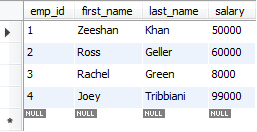2- Concepts of DBMS,RDBMS ,SQL and DBMS vs RDBMS
What is DBMS?
Database Management Systems (DBMS) refer to the technology solution used to optimize and manage the storage and retrieval of data from databases.
DBMS was designed to solve the fundamental problems associated with storing, managing, accessing, securing, and auditing data in traditional file systems.
DBMS offers a systematic approach to manage databases via an interface for users as well as workloads accessing the databases via apps.
The management responsibilities for DBMS encompass:
--> Information within the databases
--> The processes applied to databases, such as access and modification
--> The database’s logic structure
Benefits of DBMS
Introducing DBMS software to manage databases results in the following benefits:
Data security- DBMS allows organizations to enforce policies that enable compliance and security.
Data sharing- Fast and efficient collaboration between users.
Data integration- Instead of operating island of database resources, a single interface is used to manage databases with logical and physical relationships
Abstraction and independence- changes to the logical schema can be applied without altering the apps and services that access the databases.
Uniform management and administration- A single console interface to perform basic administrative tasks makes the job easier for database admins and IT users.
What is RDBMS?
A relational database management system (RDBMS) is a type of DBMS with a row-based table structure.
Most commercial RDBMSes use SQL. The most basic RDBMS functions are related to Create, Read, Update and Delete operations(C,R,U,D) collectively known as the CRUD cycle.
Features of RDBMS:
--> An RDBMS is easily accessible using SQL commands.
--> An RDBMS provides full data independence.
--> The basic unit of data storage in a relational database is called a table.
--> A table consists of tuples/rows/records and each record has one or more columns used to store values.
--> In RDBMS, we can use conditional operations such as joins and restrictions.
--> An RDBMS enables data sharing between users.
--> Also at the same time, you can ensure consistency of data across multiple tables by using integrity constraints.
--> An RDBMS minimizes the redundancy of data.
Features of SQL:
--> High performance
--> High availability
--> Easy to learn and use
--> Robust transactional support
--> Functionally complete
--> Highly secure
--> Comprehensive application development
--> Management ease




Comments
Post a Comment